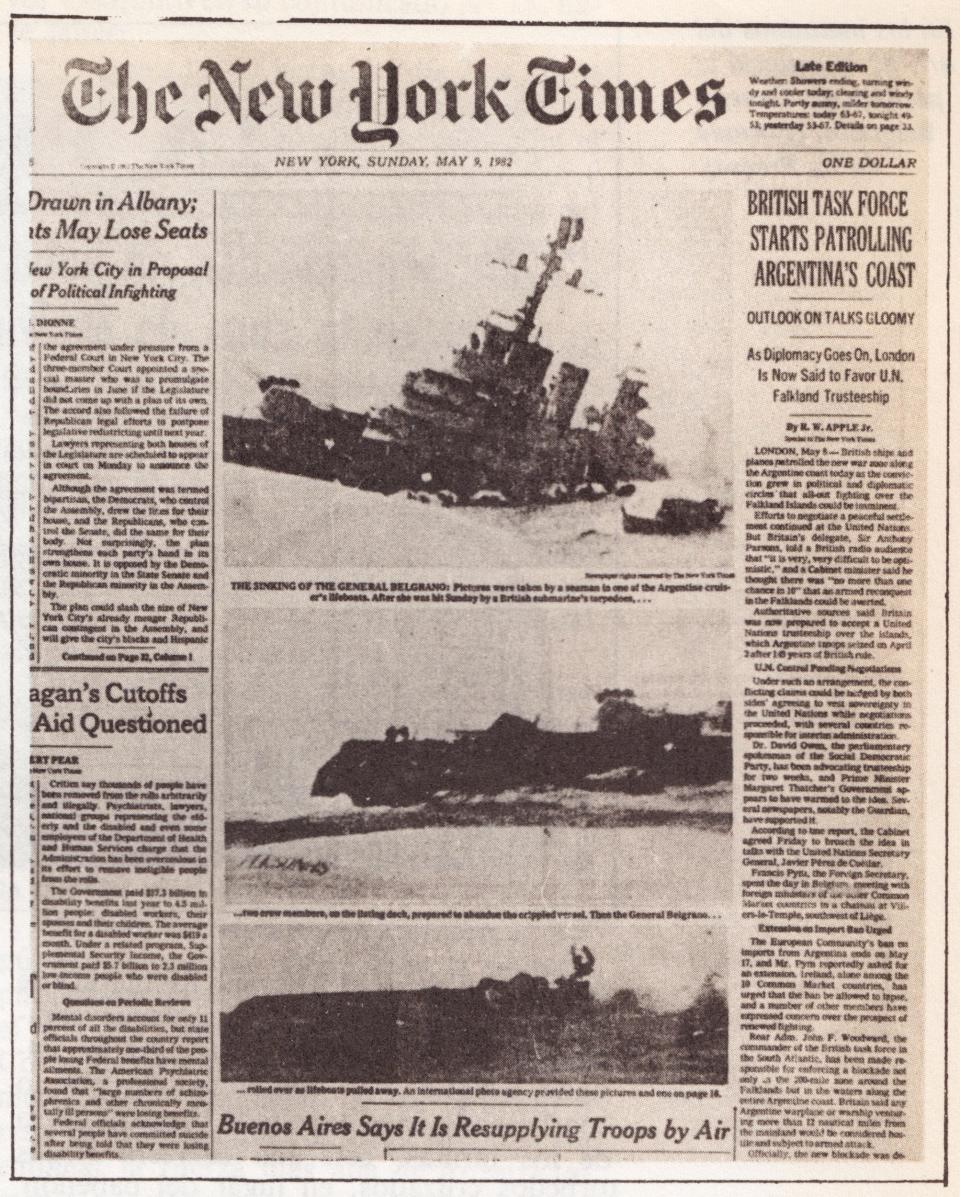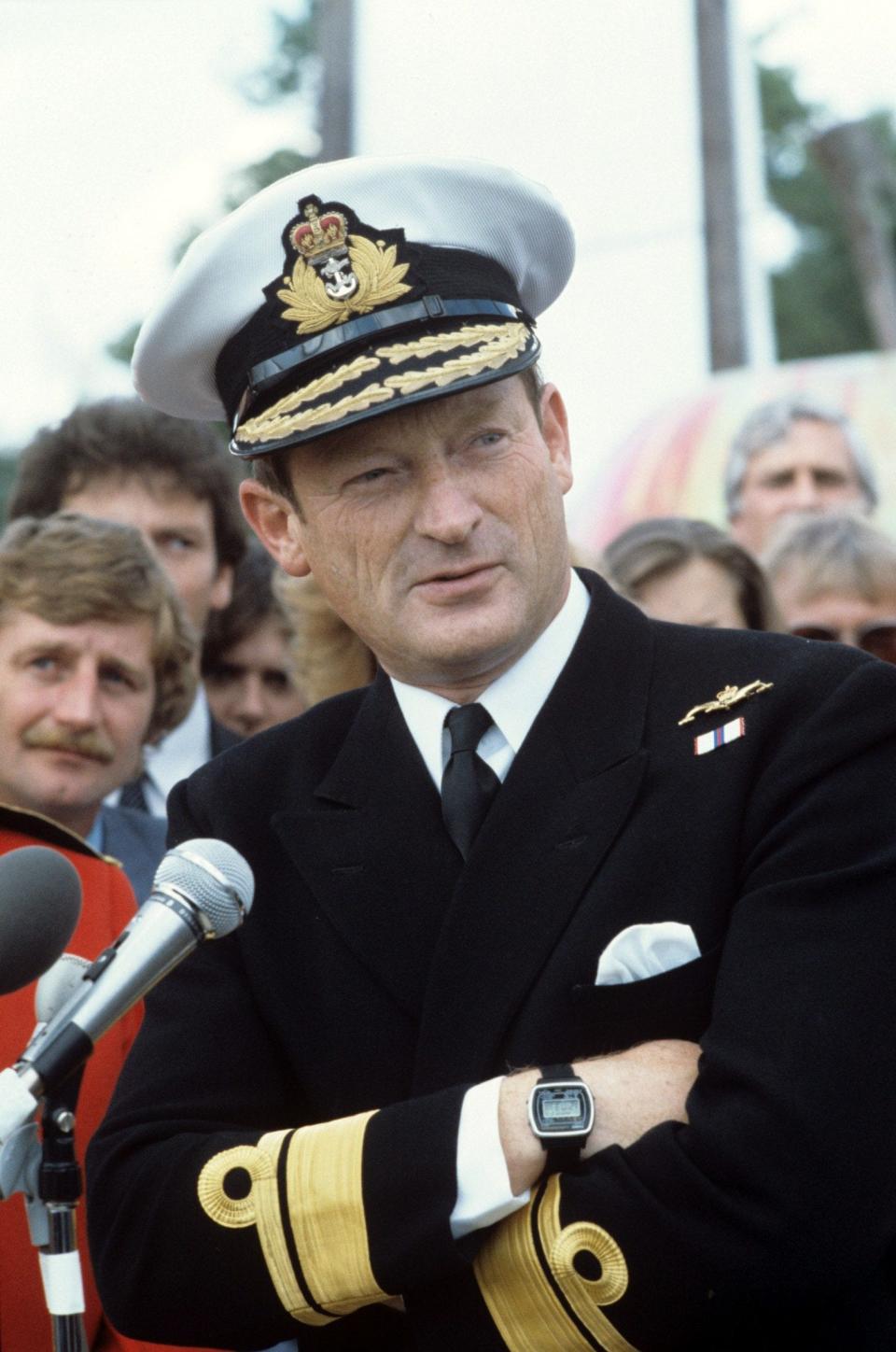Clive Ponting, MoD official who leaked documents about the sinking of the Belgrano – obituary

Clive Ponting, who has died aged 74, was as a young MoD official the cause of Whitehall reforming the Official Secrets Act after decades of resistance, through his acquittal in 1985 on charges of having leaked to the Labour MP Tam Dalyell sensitive papers on the sinking of the Argentine cruiser General Belgrano during the 1982 Falklands conflict.
Margaret Thatcher had told the Commons the Belgrano was steaming toward the 200-mile exclusion zone imposed by Britain around the Falklands when she was torpedoed by the submarine Conqueror on May 2 1982, with the loss of 323 of the ship’s company of 1,095.
However, Ponting had himself drafted two papers stating that the cruiser – which as the USS Phoenix had survived Pearl Harbor – had altered course and was moving away from the zone.

In fact, the Task Force Commander, Rear Admiral “Sandy” Woodward, had received intelligence concerning a planned Argentine attack and was convinced that Belgrano, rather than moving decisively away, was simply manoeuvring near the edge of the exclusion zone – and remained a clear threat.
But when the papers, which became known as the “Crown Jewels”, were withheld from the Foreign Affairs Select Committee, Ponting decided the true facts as he saw them had to be brought to the attention of the public.
His leak to Dalyell, who had opposed the recapture of the Falklands from the outset, was seized on by the Labour gadfly as proof not only that the Prime Minister had lied to the Commons, but that the sinking had been ordered to scupper a peace plan tabled by President Belaundé of Peru.
Dalyell pursued this campaign until he left the Commons in 2005, being ejected several times by the Speaker for “unparliamentary” accusations against Mrs Thatcher.
A highly able man who at 38 was heading the MoD’s Defence Secretariat 5 and had earned Mrs Thatcher’s respect, Ponting had had Whitehall at his feet. The revelations ended his civil service career, after which he spent 19 years as an academic in the field of “big history”.
Yet the revelations he expected to put him in prison – bringing a toothbrush and the sayings of Buddha to the final day of his trial at the Old Bailey – were not quite what Dalyell made them out to be.

The Prime Minister had indeed erred in stating that the Belgrano was sailing toward the exclusion zone when she was engaged. But she had spoken on the basis of inaccurate briefing from senior naval officers, and when she realised the truth she felt she had to stick by them, risking accusations of a cover-up.
Moreover, Dalyell’s argument that the sinking of the 9,575-ton cruiser had been ordered to prevent the Peruvian peace plan gaining traction internationally did not hold water: Conqueror had fired its torpedo hours before London was aware of the plan.
Nevertherless, when the documents reached him by post in July 1984, Dalyell realised they were political dynamite. He passed them to the select committee, whose chairman contacted the defence secretary Michael Heseltine, who ordered a leak inquiry.
The papers were soon traced to their author, whose secretariat was responsible for advice and assistance to naval staff. Ponting was interviewed by two MoD Police officers, who told him they were not sure an offence had been committed. They suggested he quietly resign.
Ministers, however, demanded his prosecution. Ponting was not helped by the MoD’s embarrassment over the case of Sarah Tisdall, a junior civil servant jailed the year before for sending photocopies of documents concerning the deployment of US cruise missiles in Britain to the Guardian.
After Ponting admitted being the source of the leak, the MoD suspended him without pay – a decision Mrs Thatcher countermanded when she heard of it. And on August 17 1985, he was charged under Section 2 of the 1911 Official Secrets Act.
Ponting’s trial, before Mr Justice McCowan and a security-vetted jury, attracted huge public interest and debate. His defence was that the facts, and their disclosure to an MP, were in the public interest. It was the first case under the Act to involve information passed to Parliament.
His barrister, Bruce Laughland QC, insisted the case was about “lying, not spying”. He said the issue was “whether the Crown can prove that Mr Dalyell was not a person to whom he was authorised to communicate, or a person to whom it was, in the interests of the state, the defendant’s duty to communicate.”
The court heard that at the time of the Falklands, Ponting had been head of the MoD’s division dealing with legal matters (dealing, inter alia, with cases under the Official Secrets Act). He was involved in requisitioning merchant ships, and applying the Geneva Convention to the handling of Argentine prisoners of war.
Ponting told the court: “It was a fascinating and stimulating time of working together for a common purpose.” He had been sympathetic to the recapture of the islands, but reached a “watershed” when the government refused to disclose relevant documents to the select committee.
In his summing-up, the judge effectively instructed the jury to convict Ponting; indeed he had told counsel in mid-trial that he was considering halting the case and giving a direction to convict.
As to Ponting’s contention that he was acting in the interests of the state, McCowan told the jury those interests must mean the interests of the government of the day. Ponting’s official duty was not to disclose the information, and “the public interest is what the government of the day says it is”.
The jury did not accept this, and on February 12 1985 Ponting was acquitted.

Ministers now faced the political reality that with a conviction impossible to obtain in such a high-profile case, the Official Secrets Act had to be reformed. Backbench MPs had repeatedly tried to – in 1978/79 nearly getting a Bill through – but successive governments had resisted.
The reformers’ main target was the “catch-all” Section 2, which outlawed the communication of any official information. The 1989 Official Secrets Act that resulted from Ponting’s trial did remove this provision, and limited the application of the Act to defence, international relations, and crime. But it also removed the defence of acting in the public interest, on which Ponting had relied.
After his acquittal, Ponting resigned from the Civil Service. Within weeks he published his first book – The Right to Know: The inside story of the Belgrano affair, then he joined Swansea University’s Politics and International Relations department as a reader.
He always insisted he had no regrets about his role in the Belgrano affair, maintaining that he had acted throughout out of loyalty to his country.

Clive Sheridan Ponting was born on April 13 1946, the only child of Charles Ponting and the former Winifred Wadham. From Bristol Grammar School, he took a First in History at the University of Reading. He started a PhD at University College London, but abandoned it after two years to join the MoD in 1970.
After Mrs Thatcher came to power in 1979, he joined a team tasked with identifying savings in the department. That October he made a presentation to the Cabinet, showing how the armed forces could save £5 million on stock and £500,000 a year on food supply costs.
Mrs Thatcher laughed at Ponting’s jokes, praised him in Cabinet, and put him forward for an OBE. He, in turn, admired her determination to cut waste and improve the quality of administration in Whitehall.
With her approval, he investigated why military dentistry cost twice as much as its civilian equivalent and whether military bands really needed 3,000 full-time personnel.
As an academic, Ponting became a prolific, and at times revisionist, historical author. His most influential book is probably A Green History of the World (1991), revised as A New Green History of the World in 2007, and his most controversial a 1993 biography of Churchill.
One reviewer wrote of its impact: “Ponting shattered the Churchill illusion for his readers leaving them little to piece together, just marble shards on the floor of his looted temple”. He depicted Sir Winston as a racist who wanted to forcibly sterilise “mentally degenerate” Britons and send tens of thousands of others to labour camps.
Retiring in 2004, Ponting and his fourth wife lived first on the Aegean island of Alonnisos, then in a village in the south of France.
After the 2016 referendum vote for Brexit, they moved to Kelso in the Scottish Borders, where in 2018 he joined the SNP, warning that, in the event of a no-deal Brexit, Westminster would use emergency powers to dissolve the Scottish government.
Ponting was an enthusiastic railway modeller, loved the music of Mahler, and had a deep affection for cricket – though not for the rulers of the game whom he considered irredeemably Victorian.
Clive Ponting was married four times. His first three marriages, to Katherine Hannam in 1969; to Sally Fletcher, a colleague at the MoD, in 1973; and to Laura, who later taught in Vietnam, were dissolved. His fourth wife, Diane Johnson, died in March. There were no children.
Clive Ponting, born April 13 1946, died July 28 2020

 Yahoo News
Yahoo News 